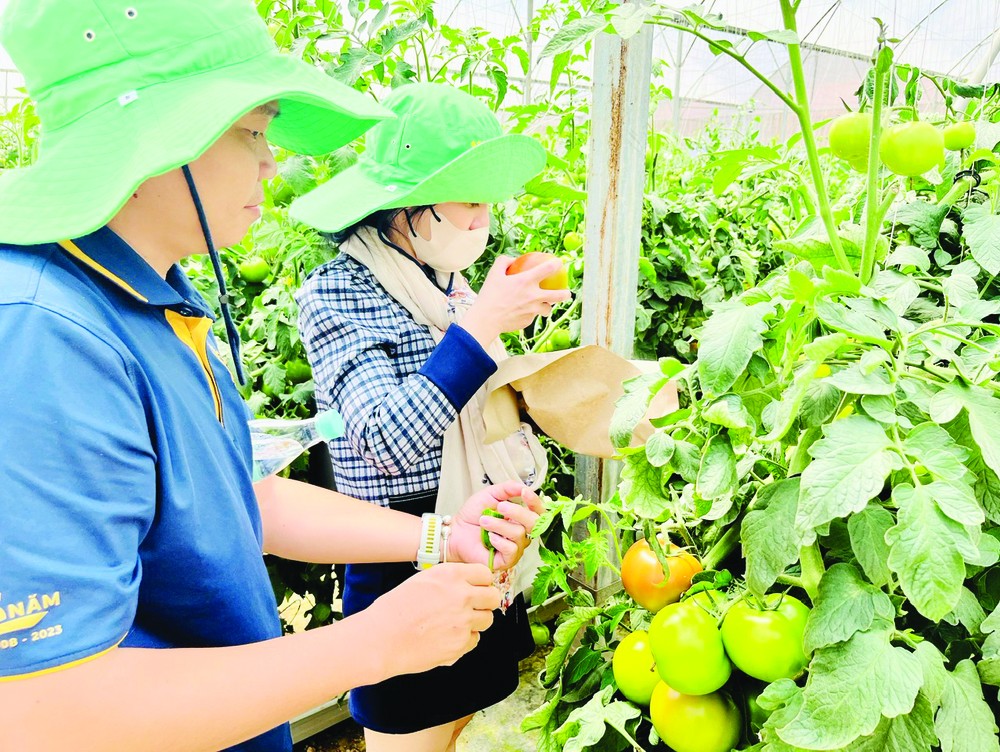The demand for agricultural products of Ho Chi Minh City people is very huge while housewives are worried about buying unsafe vegetables and fruits. Therefore, the Department of Industry and Trade of Ho Chi Minh City connects with growers to bring clean agricultural produce to city dwellers.

Staff from the Department regularly go to farms nationwide to look for fresh and safe agricultural products to safeguard the quality of food from production to consumption ( referred to as ‘from farm to fork’ or ‘from farm to table’).
It is estimated that city dwellers consume about 2,000 tons of rice, over 4,200 tons of vegetables, tubers and fruits, more than 1,000 tons of meat including pork, chicken, and beef and about 2 million eggs every day.
Farms in Ho Chi Minh City can only provide 10 percent of all types of meat and nearly 5 percent of eggs while the remaining supplies come from provinces and cities across the country such as Lam Dong, Dong Nai, the Mekong Delta region and imports. However, the quality of goods delivered to retail markets is a big headache for responsible agencies.
Based on the orientation of the Department of Industry and Trade of Ho Chi Minh City as well as the Food Administration, the Department of Agriculture and Rural Development, from the beginning of March 2024 until now, some 7 commercial systems including Saigonco.op, Satra, MM Mega Market, Central Retail, AEon Mall, Bach Hoa Xanh, WinCommerce signed a pilot agreement to prevent unsafe products.
The agreement includes 3 stages. Under the agreement, if a supermarket discovers that a product violates food safety, it will notify the remaining supermarkets. Within 24 hours, these supermarkets temporarily stopped business to review the process. In case the supplier intentionally violates multiple times, the contract may be terminated.
The agreement applies to products belonging to the fruit group such as cat chu mango, king orange, green-skinned grapefruit, white dragon fruit and melon; a group of vegetables such as green lettuce, bok choy, white cabbage, regular tomatoes, regular cucumbers and pork, chicken. It is expected that the above-mentioned supermarkets will apply the agreement on all commodities in the upcoming time.
Some gardeners and businesses have signed the above cooperation commitment because their products meet a series of standards such as VietGAP and GlobalGAP.
According to Director Phan Quoc Hoang of Da Lat City-based Thao Nguyen Xanh Company in the Highlands Province of Lam Dong, the cooperation initiative of retail systems as well as Ho Chi Minh City's Industry And Trade Department in joining hands to tighten food safety is very good.
Meanwhile, Food Executive Director Dang Thi Phuong Ninh of GreenFeed Group in the Southern Province of Dong Nai said that many countries around the world have been monitoring safe food at supermarkets for years.
Most businesses supplying agricultural products like vegetables, fruits, meat, and poultry to commercial systems in Ho Chi Minh City said they have a lot of experience in providing vegetables and fruits. Some businesses said they have been close partners of Saigon Co.op and Satra for decades.
Pham Quoc Huy, Deputy General Director of VietFarm Company, said that the company's products are meeting EU, VietGAP, GlobalGAP standards. When exporting to the EU or Korea, the company must test samples each worth VND5 million-VND6 million equivalent to VND20 million a week. Depending on the customer segment and standards of each supermarket, if the supermarket sets criteria lower than the standards achieved by the supplier, it will directly affect the price, leading to suppliers’ losses.
Similarly, Director Bui Trung Kien of Xuan Thai Thinh Company in Lam Dong said that his enterprise supplied the Ho Chi Minh City market with over 600 tons of vegetables per month before the Covid-19 epidemic, but now it has decreased to over 200 tons. Worse, the company must regularly work with supermarkets to reduce the prices of goods and stimulate consumer demand.
























